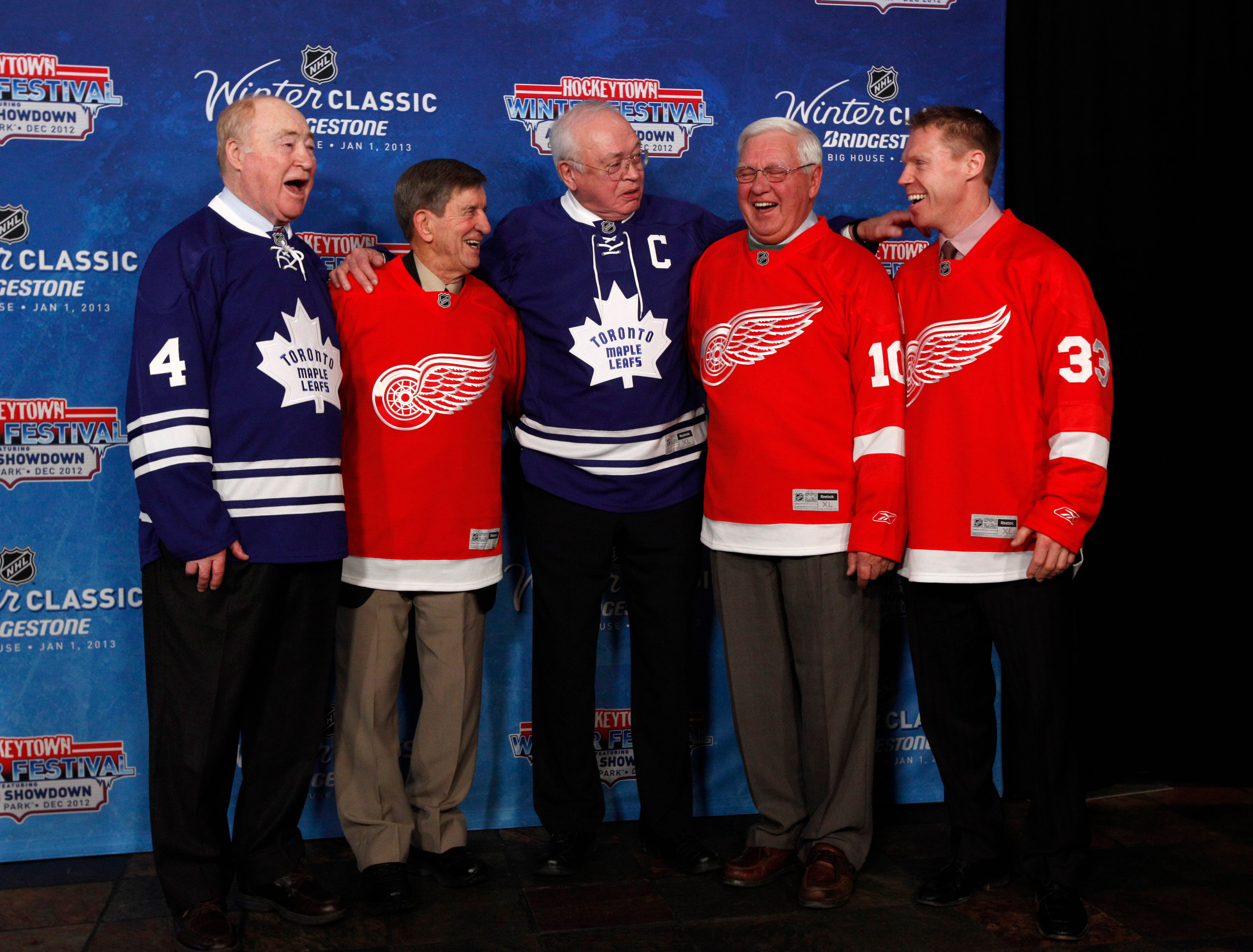Red Kelly was straw that stirred great 1950s Red Wings teams
 Gregg Krupa
Gregg Krupa
Detroit – The Maple Leafs passed on young Red Kelly.
Big mistake.
Like Ted Lindsay, Kelly eluded the grasp of Toronto, one the two domineering Canadian franchises in the NHL, emerging from World War II.
James E. Norris owned the Red Wings and helped finance the Rangers, Bruins and Black Hawks. But, the two Canadian teams of the so-called Original Six held sway.
Nearly every player in the league was Canadian. Most wanted to play for the Leafs or the Canadiens.
When they signed Kelly in 1947, the Wings were winners of three Stanley Cups in their first 21 seasons.
While the Leafs fretted about his durability, the Wings hoped the swift puck-handling defenseman with enough offensive skills to play forward, would help elevate their performance against the great Canadian powers.
He did. And, Friday, the Red Wings will retire his number, 4. It is the eighth number retired by the franchise in its 93 seasons.
In Kelly’s 13 seasons in Detroit, the Wings finished first eight times, won four Stanley Cups and played in the finals three other times.
He was a six-time first-team all-star. An injury prevented his seventh.
Kelly won the first Norris Trophy, for best defenseman, in 1954, when he also finished second for the Hart Trophy for the most valuable player. He finished in the top five for the Hart three more times, and second for the Norris twice.
He won the Lady Byng Trophy, awarded for “gentlemanly conduct combined with a high standard of playing ability,” three times.
Asked which of the titanic talents of the era, Gordie Howe or Maurice “Rocket” Richard of the Canadiens, he would prefer on his team, Bruins coach Lynn Patrick said, “Neither! I’ll take Red Kelly.”

In 1961, Kelly ran for Parliament in the Toronto-area riding of North York.
He won that, too. Then, he won re-election.
“Oh, he was great! Definitely,” said Alex Delvecchio, who played from 1950 to 1973 for the Wings, winning three Stanley Cups and scoring 1,281 points in 1,459 games.
“One heck of an asset for our hockey club. He was a stalwart for us. He was an offensive defenseman. He could score goals and he was always a threat.
“He was a great stick man, with the puck. You couldn’t get it away from him.”
Marty Pavelich, a great defensive forward, one of the best skaters of the era and a member of the four Stanley Cup winning teams of the 1950s, said Kelly’s puck-moving skills were rivaled by few defensemen.
“He was a good skater and he could carry the puck really well,” said Pavelich, 91, who roomed with Kelly. “He was more of that than anything else.
“You had a lot of guys who were key, at that time,” he said, of the powerful 1950s Red Wings teams. “He was an all-star. He was a good one.
“His teammate Benny Woit used to stay back all of the time, and he had a few other guys that he played with, and Red was the guy who was the rusher. He’d get the puck out.”
Kelly often triggered a Red Wings offense capable of quick strikes and rivaling the speedy Canadiens.
'I was lucky, always'
As a boy, Kelly learned to skate on the swamps of the north Lake Erie shore near his family’s farm, about 80 miles west of Niagara Falls. Playing soccer in his grade school yard inured the footwork Kelly would use to help mystify NHL opponents with his puck control.
When his dad, Pete, who had played hockey at St. Michael’s College School, in Toronto, bought his son a pony, Red rode him bareback to nearby Port Dover for organized youth hockey.
A few years later, Kelly went to St. Mike’s where, like Lindsay and many of the more than 100 NHL players who attended the prep school, he fell under the guidance of the athletic director and assistant hockey coach, Father Edward “Ted” Flanagan, a Basilian priest.

As many future NHL players learned, Father Ted knew hockey.
“When I was young, back home on the farm, I used to carry the puck up, when I played defense,” Kelly said.
“And, when I came to St. Mike’s when I was 14 or 15, with Father Flanagan, I skated three times more than I would back on the farm.
“He taught me how to skate so I could skate down the ice with a cup of coffee on my back and not let it spill,” he said. “So, your power went from your hips down to the ice, and you didn’t let your hips come up.
“Nobody would know how fast you were skating,” Kelly explained. “You had no arm movements, or anything.
“They thought they had you all lined up. But, you’d increase the speed a little bit and they’d only get a piece of you.”
Joe Primeau, the former Maple Leafs star and a head coach at St. Michael’s, taught Kelly how to pass in ways difficult to defend.
“I was lucky, always,” Kelly said. “I had great coaches. The timing I had was really unbelievable.
“I did everything that they told me to do, and I credit everything to the coaches I had at St. Mike's.”
At 16, he scored 18 goals and assisted on eight in 11 games during the national Junior B championship run.
The performance helped bring Kelly face-to-face with the same man who had summoned Lindsay from St. Michael’s, for the Red Wings. Carson Cooper, a high-scoring forward for the Cougars and Falcons, before they became the Red Wings, was chief scout for the franchise.
In addition to Kelly and Lindsay, Cooper scouted Delvecchio, Howe, Terry Sawchuk and Harry Lumley -- six members of the Hockey Hall of Fame, and five of the eight numbers retired by the franchise.
Like many of the players on the great 1950s teams, Kelly talked about their tremendous esprit de corps.
“Well, it was great team, and we were all young,” he said. “Off the ice, we used to bowl together, we’d go dancing and to parties together.
“Lindsay and Howe and Pavelich and great guys like (Bill) Quackenbush and Jack Stewart, Leo Reise, we were a real team on an off the ice.
“We all had the Red Wings emblem on our backside.”
'He just went about his job'
When Lindsay talks about their camaraderie, he uses the same figure of speech. But, characteristic of both men, Lindsay employs a coarser word for the body part.
“Red never swore,” Pavelich said. “He said, ‘Aw, shucks! Doggone it! Gee whiz!’
“He never swore, ever.
“And, that’s the way he was,” Pavelich said. “He was just a very quiet, easy-going guy.”

Delvecchio said Kelly maintained such a low profile, it is almost difficult to remember stories to tell about him.
“I’ve been trying to recall this and that, and you barely knew he was in the room,” the former Red Wings captain and coach said, laughing.
“He didn’t speak up or shout or really get that excited.
“Around the dressing room you never heard anything from him,” Delvecchio said. “On the bench, you never heard anything.
“He just went about his job. And, he was fantastic at it!”
Near the start of his last season with the Red Wings, a reporter asked about his slowness at the end of the previous one.
Kelly said he told the reporter, “It might have been the ankle.”
The previous season, when Kelly broke a bone in his lower leg, the Red Wings had asked him to take off the cast to see if he could skate on it, in some big games.
He played, but his performance lagged.
Kelly said the reporter wrote the story straight. But a headline writer posed the question: Had the Wings forced him to play injured?
Kelly said it was not true, he never said that and the reporter never wrote it.
The next day, he said, GM Jack Adams summoned him and told him he had been traded to the lowly Rangers.
He said he told Adams he would not report and stormed out of the office.
“I didn’t think it was right,” Kelly said.
“No one spoke to Adams like that. I don’t remember if I slammed the door.”
Eventually, the Maple Leafs, unwilling to pass over him twice, brought Kelly out of retirement.
“In those days, you never knew who was going to be traded,” Delvecchio said. “You kind of kept your nose to the grindstone and hoped you weren’t going to be involved in any of those things.
“He finally got the Toronto deal, which was to his advantage,” said Delvecchio who, with Howe, had to face the powerful Maple Leafs teams of the early 1960s, when Kelly continued winning Stanley Cups.
After the last of their four cups, in 1955, the Wings would wait another 42 years for the next one.
“For a fellow who didn’t speak up too much,” Delvecchio said, “he sure won his battle.”
Red Wings retired numbers
1: Terry Sawchuk
4: Red Kelly
5: Nicklas Lidstrom
7: Ted Lindsay
9: Gordie Howe
10: Alex Delvecchio
12: Sid Abel
19: Steve Yzerman